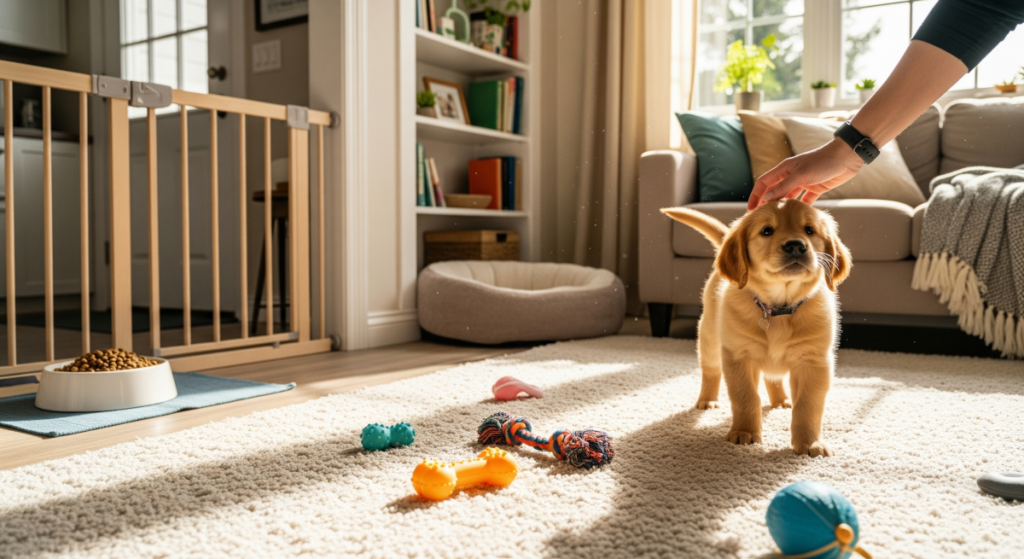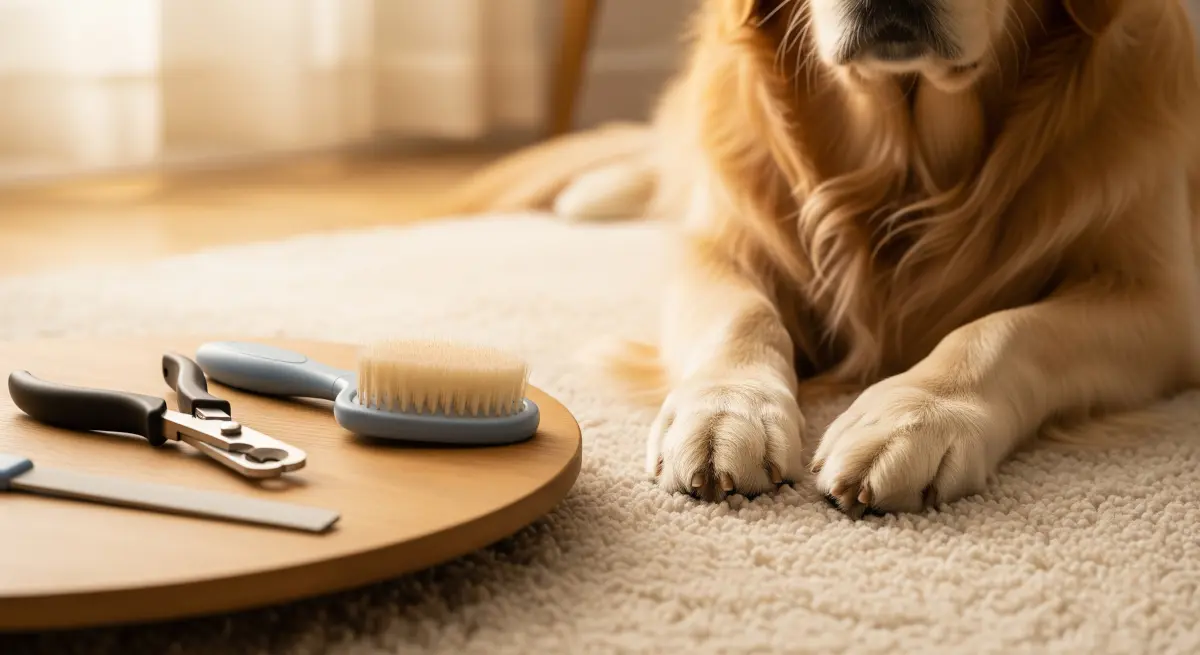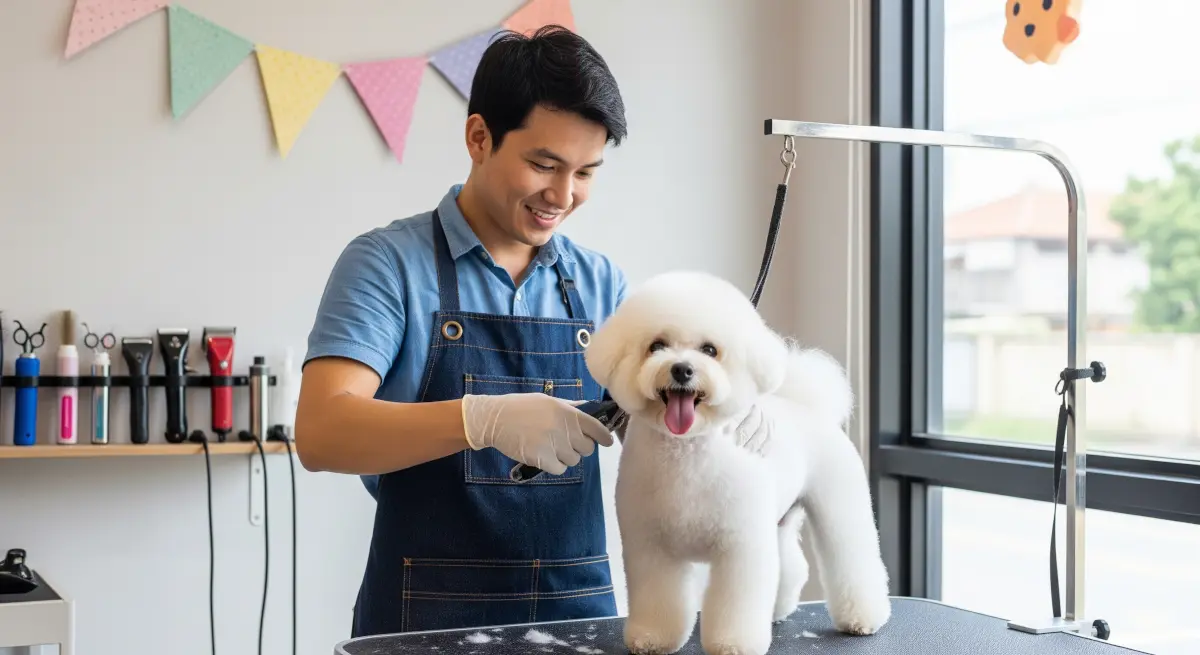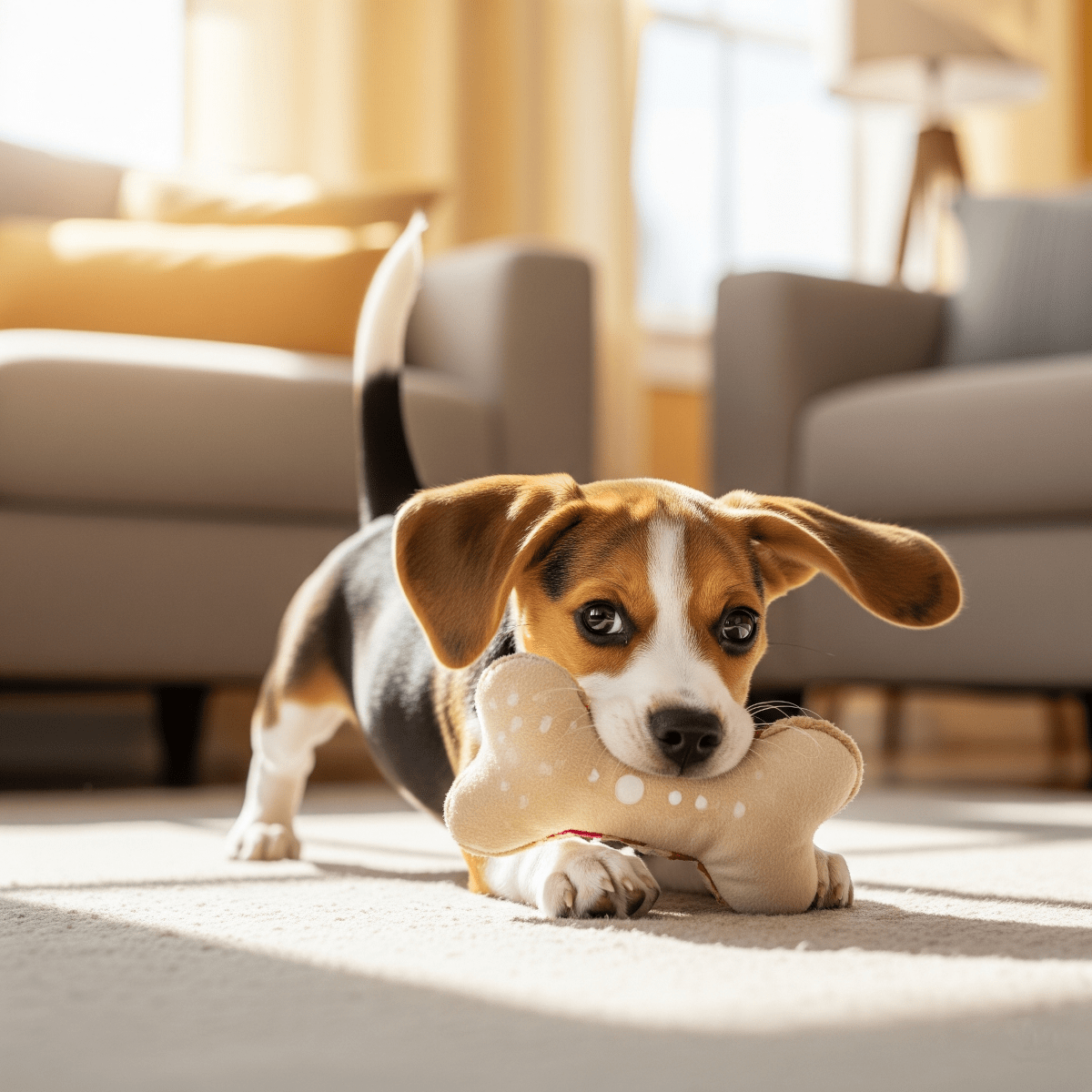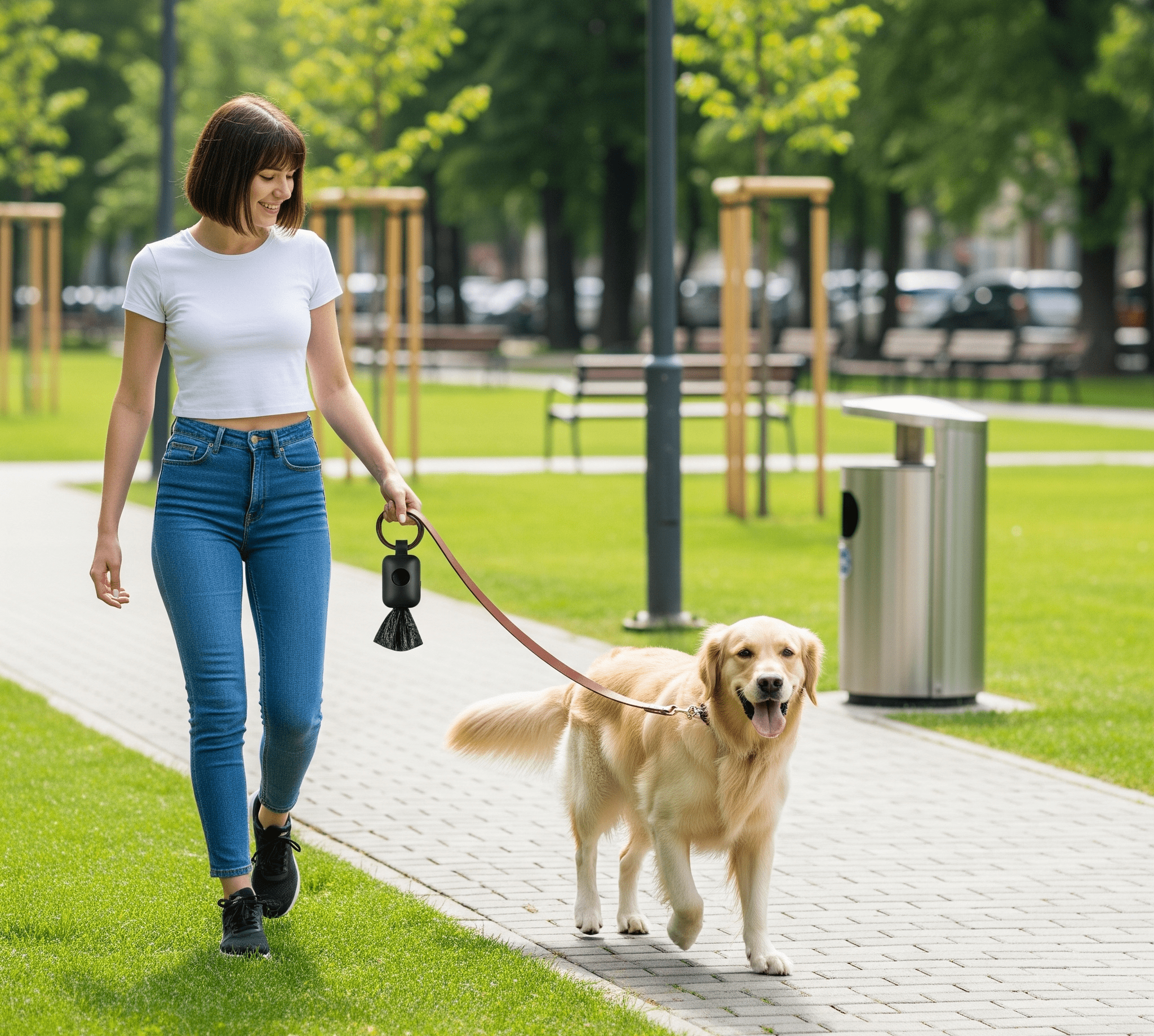Bringing home a new puppy is one of life’s most joyful experiences, but it can also feel overwhelming. With proper puppy care 101 knowledge, you’ll transform from anxious new parent to confident dog owner. This comprehensive guide covers everything from essential setup to nutrition, health care, and behavior management. Whether you’re welcoming your first puppy or need a refresher, you’ll discover proven strategies that work for busy American families. Get ready to build an unbreakable bond with your furry family member while ensuring their health, happiness, and development.
Table of Contents
- Preparing Your Home for Your New Puppy
- Essential Nutrition Guidelines
- Health and Hygiene Fundamentals
- Early Socialization and Behavior
- Common Challenges and Solutions
- The Power of Gentle Puppy Treatment
- Frequently Asked Questions
Preparing Your Home for Your New Puppy
Creating a safe, welcoming environment is your first priority in puppy care 101. Think of your home through puppy eyes – everything is new, interesting, and potentially dangerous.
Essential Safety Measures
Start by puppy-proofing your living space. Secure windows and balconies, install baby gates at the top and bottom of stairs, and remove toxic plants like azaleas, lilies, and certain ornamental shrubs. Puppies explore with their mouths, so eliminate small objects they could swallow and hide electrical cords.
Create a dedicated resting area that’s cozy and accessible. This becomes your puppy’s safe haven – a place they can retreat when overwhelmed. Choose a quiet corner with comfortable bedding that allows room for growth as your puppy develops.
Establishing Daily Structure
Puppies thrive on routine, which builds their sense of security and aids training efforts. Establish consistent feeding times, play sessions, and rest periods from day one. This structure becomes the foundation for successful house training and behavioral development.
Plan for two daily walks once your puppy is fully vaccinated – typically 20-40 minutes total. Use an anti-pull harness for safety and comfort, as traditional collars can damage developing neck muscles and airways.
Essential Nutrition Guidelines
Proper nutrition during puppyhood sets the stage for lifelong health. The months between 8 weeks and 1 year are critical for growth and development.
Choosing the Right Food
Feed high-quality commercial puppy foods specifically formulated for growth. These contain higher protein levels and balanced nutrients compared to adult dog foods. Look for brands that meet AAFCO (Association of American Feed Control Officials) standards for complete and balanced nutrition.
Establish feeding areas and stick to set meal times. This consistency supports house-training efforts and helps prevent food aggression. Most puppies need 3-4 meals daily until 6 months old, then transition to twice daily feeding.
Foods to Avoid
Never give puppies chocolate, grapes, raisins, onions, garlic, xylitol (artificial sweetener), or alcohol. These substances are toxic to dogs and can cause serious health problems or death. Always provide fresh, clean water in a designated bowl.
Health and Hygiene Fundamentals
Regular hygiene routines keep your puppy healthy and comfortable while teaching them to accept handling – crucial for vet visits and grooming throughout their lives.
Bathing and Grooming
Bathe puppies every 3 weeks using vet-recommended, high-quality shampoos. Over-bathing strips natural oils and causes skin dryness. Rinse thoroughly to prevent irritation.
Daily brushing promotes coat health and helps puppies adapt to grooming sessions. During shedding seasons, use specialized tools like shedding gloves or undercoat rakes. Make grooming positive with treats and praise.
Dental and Overall Care
Start dental care early with puppy-safe toothbrushes and toothpaste. Monitor chewing habits and provide appropriate toys to support natural teeth cleaning.
During daily care routines, check eyes and ears. Clean with warm water-soaked cotton to remove dirt and discharge while watching for abnormalities like excessive redness, swelling, or odor.
First Aid Preparedness
Maintain a basic pet first aid kit including disinfectants, digital thermometer, disposable gloves, gauze, tweezers, emergency muzzle, saline solution, and emergency veterinary contacts. Quick access to these supplies can make crucial differences in emergency situations.
Early Socialization and Behavior
The critical socialization period occurs between 3-14 weeks of age. During this window, positive experiences shape your puppy’s lifelong attitude toward people, animals, and environments.
Building Confidence Through Exposure
Introduce gentle, positive experiences gradually. Start with family members, then expand to friendly neighbors, well-behaved dogs, and various environments. Keep interactions short and positive, always watching your puppy’s body language for signs of stress.
Expose puppies to household sounds like vacuum cleaners, doorbell rings, and kitchen noises at low volumes, gradually increasing as they show comfort. This prevents noise phobias later.
Managing Normal Puppy Behaviors
Teething and mouthing are normal developmental phases, not behavioral problems. Provide appropriate chew toys to soothe discomfort and redirect biting from inappropriate items like furniture or hands.
When puppies mouth or bite during play, yelp sharply and immediately stop interaction. This mimics how littermates communicate boundaries and teaches bite inhibition naturally.
Common Challenges and Solutions
Every puppy parent faces similar challenges. Understanding what’s normal and having practical solutions reduces stress for both you and your puppy.
House Training Success
House training requires patience and consistency. Take puppies outside first thing in the morning, after meals, before bed, and every 2-3 hours between. Always go to the same spot and use a consistent command like “go potty.”
Reward successful outdoor elimination immediately with treats and enthusiastic praise. Never punish accidents – simply clean thoroughly with enzymatic cleaners to remove odors that might attract future mistakes.
Vaccination Schedule
Follow your veterinarian’s vaccination schedule religiously. Core vaccines typically include distemper, parvovirus, adenovirus, and rabies. Keep puppies away from high-risk environments like dog parks until fully vaccinated, usually around 16 weeks.
Puppies typically receive vaccines at 6-8 weeks, 10-12 weeks, and 14-16 weeks, with annual boosters thereafter. Your vet may recommend additional vaccines based on your location and lifestyle.
Sleep and Energy Management
Puppies sleep 18-20 hours daily, but when awake, they’re bursting with energy. Provide mental stimulation through puzzle toys and training sessions to tire their minds along with physical exercise.
For apartment dwellers, focus on indoor activities and controlled socialization until outdoor exercise is safe. Interactive toys and short training sessions can be as tiring as physical exercise for young minds.
The Power of Gentle Puppy Treatment
How you treat your puppy during these formative months impacts their entire personality and your relationship. Puppy treatment based on patience and positive reinforcement creates confident, well-adjusted adult dogs.
Building Trust Through Consistency
Puppies are incredibly sensitive to the quality of care and interaction they receive. Consistent, positive treatment builds confidence and physical health simultaneously. Research from veterinary behavioral studies shows that puppies raised with patience develop better social skills and exhibit fewer behavioral problems throughout their lives.
Use positive reinforcement – praise, treats, and play – to encourage desired behaviors. This approach is scientifically proven superior to punitive methods for fostering cooperation and reducing stress.
Understanding Puppy Psychology
According to the American Veterinary Medical Association, the critical socialization period is vital for reducing future behavioral problems. Gentle, consistent treatment during this time strengthens the human-animal bond and supports training compliance throughout the dog’s lifetime.
Never use intimidation, shouting, or physical punishment. These methods create fearful, anxious dogs and can damage your relationship permanently. Instead, redirect unwanted behaviors and reward alternatives.
Frequently Asked Questions
How often should I feed my puppy?
Puppies under 6 months need 3-4 meals daily, spaced evenly throughout the day. After 6 months, transition to twice daily feeding. Consistent meal times support house training and prevent digestive issues. Always use high-quality puppy food formulated for growth and development.
When can my puppy go outside safely?
Puppies can go outside for potty breaks in your own yard immediately, but avoid public areas until fully vaccinated around 16 weeks. This prevents exposure to dangerous diseases like parvovirus and distemper. Your veterinarian will confirm when it’s safe based on your puppy’s vaccination schedule.
How do I stop my puppy from biting?
Puppy biting is normal but must be addressed early. When your puppy bites, yelp sharply and immediately stop play. Redirect their attention to appropriate chew toys. Never hit or punish – this can increase aggressive behavior. Consistency and patience are key to teaching bite inhibition.
What’s the best way to house train my puppy?
Establish a consistent routine: take your puppy out first thing in the morning, after meals, before bed, and every 2-3 hours. Always go to the same spot and use a consistent command. Reward success immediately with treats and praise. Clean accidents thoroughly with enzymatic cleaners.
How much exercise does my puppy need?
Young puppies need short, frequent play sessions rather than long walks. A general rule is 5 minutes of exercise per month of age, twice daily. Focus on mental stimulation through training and puzzle toys, which can be as tiring as physical exercise for developing minds.
When should I start training my puppy?
Training begins immediately! Start with basic commands like “sit,” “stay,” and “come” using positive reinforcement. Puppy classes can begin around 8 weeks old, even before full vaccinations, as the socialization benefits outweigh risks in controlled environments.
How do I choose the right veterinarian?
Look for veterinarians with good reviews, clean facilities, and staff who take time to answer questions. Schedule a meet-and-greet visit before emergencies arise. Consider location, hours, emergency services, and whether they seem genuinely interested in your puppy’s wellbeing.
What supplies do I need before bringing my puppy home?
Essential supplies include food and water bowls, high-quality puppy food, a comfortable bed, appropriate-sized collar and leash, ID tags, toys for different activities, grooming supplies, and a first aid kit. Don’t forget waste bags and cleaning supplies for house training accidents.
Conclusion
Mastering puppy care 101 isn’t about perfection – it’s about consistency, patience, and building a foundation of trust with your new family member. From creating a safe home environment to establishing routines, proper nutrition, and gentle training methods, every aspect of early care influences your puppy’s development into a well-adjusted adult dog. Remember that mistakes are part of the learning process for both you and your puppy. Focus on positive reinforcement, maintain consistent routines, and don’t hesitate to consult your veterinarian when questions arise. The time and effort you invest in proper puppy treatment during these crucial early months will reward you with years of companionship, loyalty, and joy. Your puppy is counting on you to provide the guidance, care, and love they need to thrive – and with this comprehensive guide, you’re well-equipped to succeed. Take a deep breath, trust the process, and enjoy this incredible journey of raising your new best friend.

